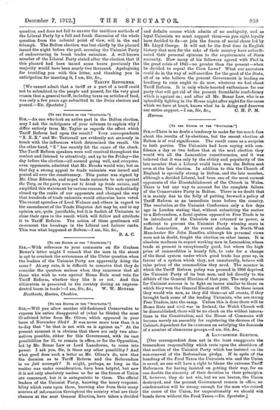[TO TEM EDITOR Or THE "SPECTATOR"]
Sin,—There is no doubt a tendency to make far too much fuss about the results of by-elections, but the recent election at Bolton is of real significance. The result came as a surprise to both parties. The Unionists had been saying with con- fidence a day or two before that at the next election they would win all the Lancashire constituencies, and it was believed that it was only by the ability and popularity of the late member that a Liberal could have won the Bolton seat even at the last election. In addition to this the Church of England is specially strong in Bolton, and the late member, although a decided Liberal, had been one of the most earnest opponents of the Disestablishment of the Church in Wales. There is but one way to account for the complete failure of the Conservative Party in Bolton. There is no doubt that it is mainly due to the folly of putting forward a policy of Tariff Reform as an immediate issue before the country. The resolution at the Unionist Conference only a few days ago in London stating that, without submitting the matter to a Referendum, a fiscal system opposed to Free Trade is to be introduced if the Unionists are returned to power, is sufficient to prevent the Unionist Party winning seats in East Lancashire. At the recent election in North-West Manchester Sir John Randles, although his personal views were not in doubt, fought the election on other issues. It is absolute madness to expect working men in Lancashire, where trade at present is exceptionally good, but where the high price of commodities is keenly felt, to vote for a change of the fiscal system under which good trade has gone up, in favour of a system which they, not unnaturally, believe wilt raise prices of the commodities they need. The manner in which the Tariff Reform policy was pressed in 1906 deprived the Unionist Party of its best men, and led directly to the ddbdtle of the General Election of that year. The only chance for Unionist success is to fight on issues similar to those on which they won the General Election of 1895. On these issues they would win now, as they did then—at all events, if they brought back some of the leading Unionists, who are strong Free Traders, into the camp. Unless this is done there will be Home Rule and civil war in Ireland, the Welsh Church will be disestablished, there will be no check on the wildest innova- tions in the Constitution, and the House of Commons will become merely an assembly for registering the decrees of the Cabinet, dependent for its existence on satisfying the demands of a number of clamorous groups.—I am, Sir, &o.,
A LANCASHIRE ELECTOR.
[Our correspondent does not in the least exaggerate the tremendous responsibility which rests upon the shoulders of that section of the Unionist Party which has insisted on the non-renewal of the Referendum pledge. If in spite of the
handicap of the Food Taxes the Unionists win and the Union is saved, no one will have a right to blame the extreme Tariff
Reformers for having insisted on getting their way, for no one doubts the sincerity of their devotion to their principles. If, however, they do not win, but we are beaten, the Union destroyed, and the present Government remain in office, no condemnation will be strong enough for the men who ruined the cause of the Union, for unquestionably we should win hands down without the Food Taxes.—En. Spectator.]






































































 Previous page
Previous page